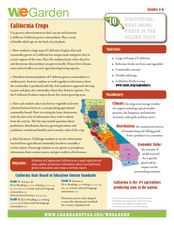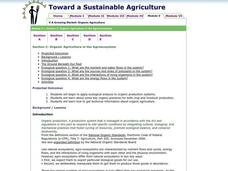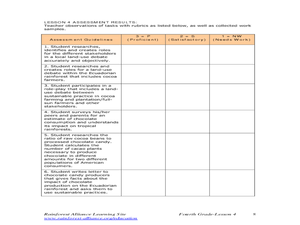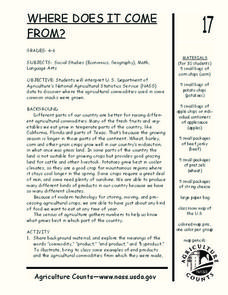Curated OER
California Crops
Students explore agriculture by researching the native food crops of California. Students define a list of agriculture vocabulary terms and analyze maps of California which explain which foods come from which area. Students write a...
Curated OER
Step by Step
Students explore agriculture by creating a food production diagram. In this farming lesson, students read assigned text about the entities that assist in food production companies such as farmers, truckers and supermarkets. Students...
Curated OER
Toward a Sustainable Agriculture
Students analyze organic production systems. In this organic agriculture lesson, students examine key organic practices for both crop and livestock. This lesson includes 5 different activities, 4 critical thinking questions and...
Curated OER
Ag in My Community; Agriculture
Students build knowledge about agriculture as it relates to their communities' commodities. In this agriculture lesson, students brainstorm about conditions in their community with regards to growing different types of crops. Students...
Curated OER
Kansas Crops: From Seeds to Food
First graders explore U.S. geography by researching food production. In this agriculture lesson, 1st graders identify the process of crops from a seed to a plate and discuss the importance of farmers in the production of such crops....
Council for Economic Education
The Columbian Exchange
What did you have for dinner last night? Many scholars ask that question without considering the history behind the foods they eat. Using a simulation, scholars investigate how the foods they eat are the product of the Columbian...
Curated OER
Where Did Foods Originate? (Foods of the New World and Old World)
What do papayas, peanuts, pineapples, and potatoes have in common? Why, they are foods explorers brought back to the Old World. Young researchers use the Internet to investigate how New World explorers helped change the Old World's diet....
Curated OER
How can we keep our forests intact and have chocolate too?
Fourth graders recognize the need to sustain crops in the rainforest. In this rainforest lesson, 4th graders consider the use of products from the rainforest. Students discuss how people of different points of view decide what to do...
Curated OER
Pesticide Watch Card
Young scholars examine human health by identifying dangerous pesticides. In this agriculture lesson, students research the food production system in the United States and discuss dangers such as pesticides, chemicals and insecticides...
Curated OER
Crops 2: What Plants Need to Grow
Learners explore agriculture by participating in a plant growth activity. For this botany lesson, students discuss what types of plants grow in their local environment and what the plants need to survive. Learners read assigned text...
Curated OER
"Wet" Your Appetite: Conserving Water
Students investigate how water is utilized in producing food. In this agriculture lesson, students examine how much water goes into the creation of their daily menu. Students create a new menu that can conserve water and cut their water...
Curated OER
Blueberries
The blueberry is the star of the show. Young farmers take a close look at the blueberry in order to begin to understand the production of small fruits. They describe the factors that affect a blueberry crop, how blueberries are grown,...
Curated OER
Pottery Quest
Middle schoolers see that the production of ceramic pottery requires detailed knowledge of the physical properties of different clays and tempering materials, as well as knowledge about how these combine and react under specific firing...
Curated OER
Dirt Babies
Dirt babies are an excellent way to show young botanists the plant life cycle. They explore the functions and industry behind grasses before growing some of their own. Use the informational text here and consider implementing some...
Curated OER
Agriculture in Your Life
Students explore the origins of food and other everyday products around the United States. In this agricultural lesson, students learn basic vocabulary and practice matching common items with their agricultural source. They categorize...
Curated OER
Apple Kinds to Products
Students become familiar with various kinds of apples and the tree they grow on. In this Apple tree lesson, students recognize the differences between apples and can identify what happens to apples in different seasons. Students cut...
Curated OER
Where Does It Come from?
Learners read articles about various agricultural products and create a map using the statistics in the article. In this agricultural statistics lesson, students look at the geography of the country and which products come from the...
Curated OER
American Indians
Eighth graders discuss their country of origin and form work groups based on their answers. For this American Indian lesson, 8th graders locate their country of origin to the lifestyle, products and living arrangements there. Students...
Curated OER
Arthur Young and the President
Students work with NASS data by converting it into prose. In this historical agriculture information lesson, students read about how George Washington communicated information about crop yields, livestock, and land values. They apply the...
Curated OER
Folklife Around the Year and Around the State
Research how seasonal changes in Louisiana affect learners' lives and the folklife of their communities and the state. They investigate differences in the seasonal round in the regions of Louisiana, including celebrations, festivals,...
Curated OER
A Tough Nut to Crack
Sixth graders explore agriculture by examining world geography. In this pecan cultivation lesson, 6th graders identify the history of the famous nut and the impact it has on the U.S. economy, diet and human body. Students define...
Curated OER
Why is Florence Boadu Learning How to Grow Pineapples?
In this Florence worksheet, students are given sentence strips, which they must arrange into three different categories. Some of these strips can help them answer the question of why she is learning to grow pineapples.
Curated OER
The Role of African Slaves on South Carolina Rice Plantations
Fourth graders investigate the role of African American slaves in rice plantations. In this slave life lesson, 4th graders discuss the products produced in the 13 colonies. Students discuss the importance of rice to South Carolina's...
Curated OER
Soybean Science
Fourth graders explore food science by participating in a cooking activity. In this soybean oil instructional activity, 4th graders listen as the teacher gives them a background on soybeans and their use by humans today. Students grind...
Other popular searches
- Crop Production Inputs
- Crop Production Slave
- Crop Production Usa Map
- Incas Crop Production
- Crop Production Usa
- Cereal Crop Production

























